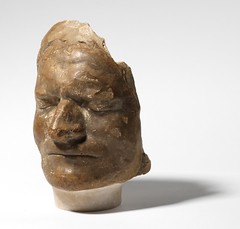
PREV ARTICLE
NEXT ARTICLE
FULL ISSUE
PREV FULL ISSUE
ISAAC NEWTON'S DEATH MASK
Here's something you don't see every day - the face of a Royal Mint Master who's been dead nearly 300 years. Thanks to the Boing Boing blog for pointing out this Royal Society post on death masks.
-Editor
In the seventeenth century it was common for the death mask to be used as part of the effigy of the deceased, and as an aid to portrait sculptures for tomb effigies. Then there were those used for art and representations of famous events, the most noted proponent being Madame Tussaud. She learned the process from her uncle Philippe Curtius, a Swiss physician who had turned his hobby into a lucrative trade. The Royal Society holds two death masks. The first, of Sir Isaac Newton, is made of plaster with a wax coating. It was the work of the sculptor John Michael Rysbrack, and was used in the preparation of Newton’s memorial in Westminster Abbey, before being purchased and presented to the Society in 1839 by Samuel Hunter Christie FRS. Newton is one of the best known of our Fellows, and was President from 1703 to his death in 1727. The mask seems to be a rather tasteful one, and is one of our most iconic treasures; it was scanned in 3D last year by the Cambridge Microsoft Research Laboratory. Masks could also be made of the living. In 1669, four years after he had been elected a Fellow, Samuel Pepys took the fashionable step of having a life mask made. He describes the experience as follows: “I was vexed to be forced to daub all my face over with Pomatum [scented ointment], but it was pretty to feel how soft and easy it is done on the face, and by and by, by degrees, how hard it becomes, that you cannot break it, and sets so close that you cannot pull it off, and yet so easy that is as soft as a pillow.” For Pepys, the slight feeling of claustrophobia came second to his enduring curiosity – a trait expected to be displayed by a Fellow of the Royal Society! To read the complete article, see: Death masks (blogs.royalsociety.org/history-of-science/2013/08/06/death-masks/)

Wayne Homren, Editor The Numismatic Bibliomania Society is a non-profit organization promoting numismatic literature. See our web site at coinbooks.org. To submit items for publication in The E-Sylum, write to the Editor at this address: whomren@gmail.com To subscribe go to: https://my.binhost.com/lists/listinfo/esylum All Rights Reserved. NBS Home Page Contact the NBS webmaster 
|
